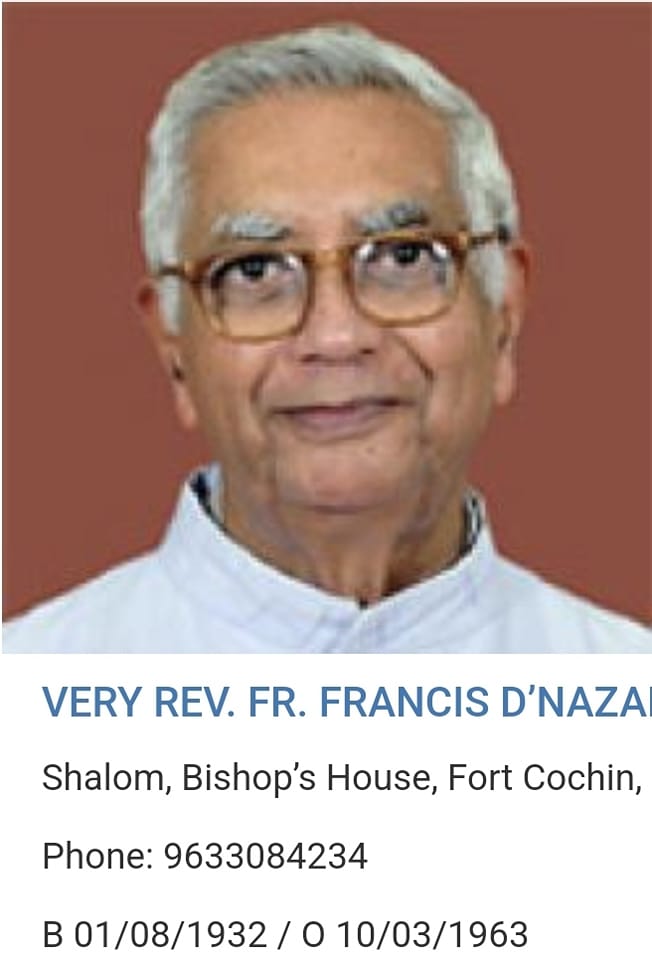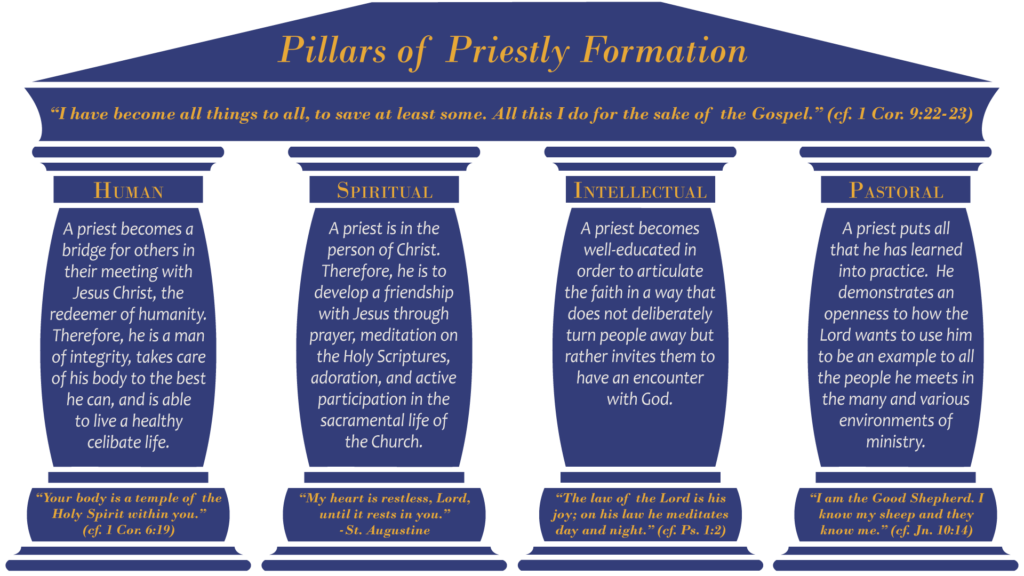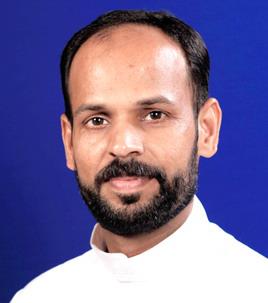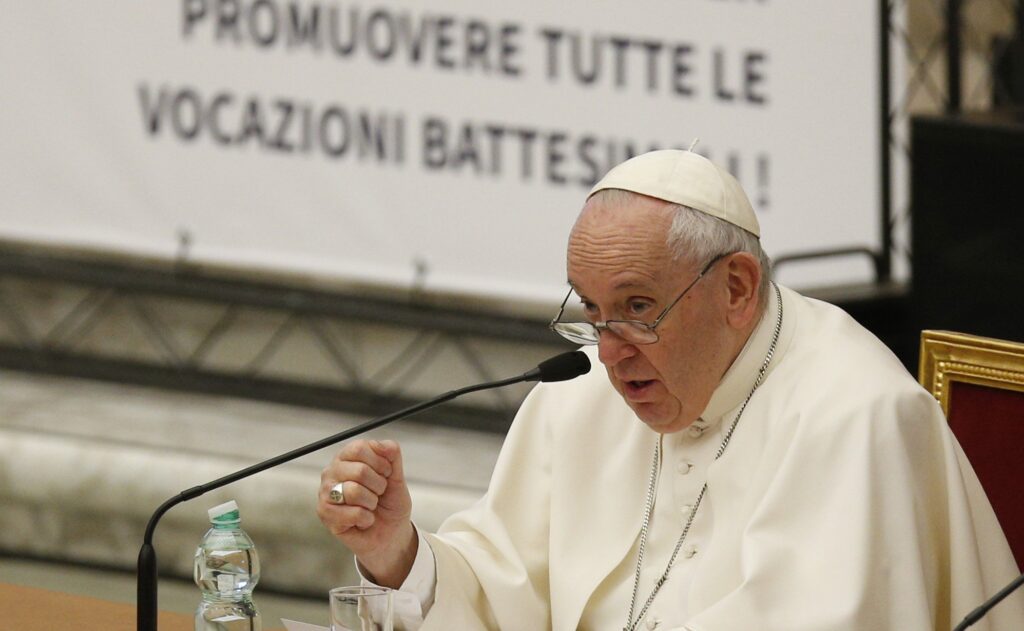*കാക്കച്ചി…. കാക്കച്ചി….. കം…*

ഇത് ഞാൻ എഴുതിയതല്ല. കൊച്ചി രൂപതയിലെ വിശ്രമജീവിതം നയിക്കുന്ന മോൺസിഞ്ഞോർ ആൻ്റണി കൊച്ചുകരിയിൽ ഞങ്ങളുടെ പ്രിയങ്കരനായ ഫാ. ഫ്രാങ്കോ ഡി നാസറത്തിനെക്കുറിച്ച് എഴുതിയതാണ്:ഇന്ന് ഒരു പുണ്യദിനം. ഫ്രാങ്കോച്ചൻ തിരുപ്പട്ടം സ്വീകരിച്ച തിൻ്റെ അറുപതാ ണ്ടുകൾ പൂർത്തി യാകുന്നു .
നമുക്ക് സന്തോഷിക്കാം. ഇത്രത്തോളം അദ്ദേ ഹത്തെ വഴി നടത്തി യ ദൈവത്തിന് ഹ ല്ലേലൂയ പാടാം.
ഗോവാക്കാരനായ പിതാവ്, ആഗ്ലൊ ഇ ന്ത്യൻ സമൂഹത്തി ലെ മാതാവ് – ഈ സങ്കരത്തിൽ 1932 ഓഗസ്റ്റ് 1 ന് പിറവി. ഫോർട്ടുകൊച്ചിയിലെ പ്രാണവായു ശ്വ സിച്ചും വീട്ടിലെ പ്രാ ഥമിക ശിക്ഷണത്തി ലും വളർന്ന കൊച്ചു ഫ്രാങ്കോ വളരെ വൈകിയാണ് വിദ്യാ ലയമെന്ന സരസ്വ തി ക്ഷേത്രത്തിൻ്റെ പടിവാതിൽ കണ്ട ത് .
ഉറക്കത്തിലും ഉ ണർവിലും ഇംഗ്ലീഷു മാത്രം സംസാരിക്കു കയും പഠിക്കുകയും ചെയ്തിരുന്ന അദ്ദേ ഹം 1963 മാർച്ച് 10 ന് അഭിഷേകം സ്വീ കരിച്ചു.വിവിധ ഇട വകളിൽ സേവനം ചെയ്ത ശേഷം ഇ പ്പോൾ വിശ്രമജീവി തം നയിക്കുന്നു . അഭിഷേക ശഷ്ഠി പൂർത്തി ദിനത്തിൽ സഹവാസികളോട് ചേർന്ന് അദ്ദേഹം ബലിയർപ്പിച്ച് ദൈ വത്തിനു നന്ദി പറ ഞ്ഞു.തുടർന്ന് കേക്കു മുറിക്കുക യും അദ്ദേഹത്തിനു മധുരം നല്കുകയും ചെയ്തു. തൻ്റെ ര ണ്ടാം ബാല്യം ഓർ മ്മിപ്പിക്കുവാൻ തല വാചകം ചൊല്ലിയാ ണ് ഫാ.ടോമി മധു രം പകർന്നത്. അച്ചന് നിരവധി പേർ ആശംസകൾ അർപ്പിച്ചു.
പൗരോഹിത്യത്തിന് നാല് തുണുകൾ ആവശ്യമാണ്.

1.ദൈവവുമായുള്ള അടുപ്പം
‘2. മെത്രാനുമായു ള്ള അടുപ്പം
3. മറ്റ് വൈദികരുമാ യുള്ള അടുപ്പം
4. ജനങ്ങളുമായു ള്ള അടുപ്പംപാപ്പനിർദ്ദേശിക്കുന്ന ഇക്കാര്യങ്ങൾ അച്ചൻ വളരെ നിഷ്ഠയോടെ കാക്കുന്നവനാണ്.
മേൽത്തരം മിഠായി യുമായി വീടുകൾ തൊറും കയറിയറ ങ്ങുന്നഅച്ചൻ അറിയ പ്പെടുന്നതു തന്നെ ആ ആധാർ കാർ ഡിലാണ്. ‘സീറോ വാട്ട്സ് ‘ ഉണ്ടൊ എ ന്ന അന്വേഷണം സ്നേഹത്തിൻ്റെ നാദമാണെന്ന് ജനം തിരിച്ചറിയുന്നു.ദുനിയാവ് എവിടെ എ ന്നു ചൊദിച്ചാൽ, സ്നെഹ പൂർവം ” ആ കുട്ടൻ എവിടെ? ചക്കര എവിടെ?” എന്നു ചോദിക്കുന്ന തിന് സമമാണ്.
അച്ചൻ്റെ ഉണ്ണീശോ യൊടുള്ള ഭക്തി, മാതൃഭക്തി ,മിഷനറി സ്പിരിറ്റ് നമുക്ക് സുപരിചിതമാണ്. ഫ്രാങ്കോ ലോട്ടറി ഏറെ പ്രസിദ്ധം.അധികം ദീർഘിപ്പി ക്കൂ ന്നില്ല……യേശുവിൻ്റെ വക്ഷ സിൽ ചാരിക്കിടക്കു ന്ന യോഹന്നാ നാ യി
മാത്രമേ എനി ക്ക് അദ്ദേഹത്തെ സങ്കല്പിക്കാൻ കഴിയുന്നുള്ളൂ.(ഷാലോം പുരാണം )

Joshyachan Mayyattil
നിങ്ങളെക്കുറിച്ചുള്ള പദ്ധതി എന്റെ മനസ്സിലുണ്ട്. നിങ്ങളുടെ നാശത്തിനല്ല, ക്ഷേമത്തിനുള്ള പദ്ധതിയാണത് – നിങ്ങള്ക്കു ശുഭമായ ഭാവിയും പ്രത്യാശയും നല്കുന്ന പദ്ധതി.
ജറെമിയാ 29 : 11
Pope Francis: Priests need to have these 4 traits in the world today

Addressing a symposium on the priesthood in the Vatican on Feb. 17, Pope Francis offered reflections that, he said, could be considered “the swan song” of his priestly life, since they are the fruit of “what the Lord has gradually helped me to realize” during more than 50 years in the ministry.
Francis was ordained a priest for the Society of Jesus on Dec. 13, 1969. In a profoundly spiritual talk today, he presented what he called the “four pillars” or “four forms of closeness” that he considers fundamental to the life of a priest “since they imitate God’s own style of God, which is essentially a style of closeness.”ADVERTISEMENT
Contrary to expectations, Francis made no direct reference to clerical sexual abuse, which has caused such a deep crisis in the Catholic Church. His aim, instead, was to present the fundamental attitudes that he believes every priest should have in the 21st century.Addressing a symposium on the priesthood in the Vatican on Feb. 17, Pope Francis presented what he called the “four forms of closeness” that he considers fundamental to the life of a priest .Tweet this
Many observers had also expected Francis to address the question of celibacy for priests in his talk, particularly since the issue came center stage at the synod on the Amazon over the question of the ordination of married men, and more recently at the German synodal way. But he chose only to make a few comments on the subject. Speaking in the context of a priest’s need for closeness to other priests, the pope said, “Without friends and without prayer, celibacy can become an unsupportable burden and a counter-witness to the very beauty of the priesthood.”ADVERTISEMENT
The symposium, on the other hand, will discuss celibacy on its final day. It is not expected to break new ground since its main organizer, Cardinal Marc Ouellet, who chose the speakers, is known to be a strong defender of the status quo.
Pope Francis said that in preparing his talk he was influenced both by the memory of the priests who during his childhood and later life had shown him “the face of the Good Shepherd” and by his own experience in accompanying priests “who had lost the fire of the first love.” He also mentioned the trials and difficulties he himself had experienced as a priest.
He said that the challenges of our age, including the ongoing Covid-19 pandemic, require priests to find new ways to respond but that many responses today lack “the flavor of the Gospel.” He said some priests seek responses anchored in the past that “guarantee” protection from risks; they take refuge in a society that no longer exists. Others adopt an attitude of “exasperated optimism” that ends up ignoring the wounds of people and fails to acknowledge the tensions, complexity and ambiguities of the present time.ADVERTISEMENT“Without friends and without prayer, celibacy can become an unsupportable burden and a counter-witness to the very beauty of the priesthood.”Tweet this
“I feel that Jesus in this moment of history is once again inviting us to ‘cast out into the deep’ [Lk 5:4], trusting that he is the Lord of history and that, with his guidance, we will discern the direction to take,” he said.
In light of these realities, Pope Francis said he had decided “to speak on what I consider decisive for the life of a priest today,” namely “the four forms of closeness”: closeness to God, closeness to the bishop, closeness to other priests and closeness to the people of God.ADVERTISEMENT
Closeness to God
He first underlined the fundamental importance of “closeness to the Lord of closeness” by quoting the words of Jesus: “I am the vine, you are the branches. He who remains in me and I in him bears much fruit, because without me you can do nothing.”
“A priest,” he said, “is invited to cultivate before all else this closeness, intimacy with God, and from this relation he can attain to all the forces necessary for his ministry.” Francis said that “many crises in the priesthood” have at their origin in “a lack of prayer life, a lack of intimacy with the Lord, a reduction of the spiritual life to a mere religious practice.”
“I remember important moments in my life in which this closeness to the Lord has been decisive in sustaining me,” Francis said.“A priest,” he said, “is invited to cultivate before all else this closeness, intimacy with God, and from this relation he can attain to all the forces necessary for his ministry.”Tweet this
He emphasized that “without the intimacy of prayer, of the spiritual life, of concrete closeness to God through listening to the Word, the celebration of the Eucharist, the silence of adoration, the entrustment to Mary, the accompaniment of a guide, the sacrament of reconciliation…a priest is only a weary hireling who has none of the benefits of the friends of the Lord.”
He acknowledged that “all this is difficult unless one is accustomed to having spaces of silence during the day.” It is difficult to avoid constant activity when one does not immediately get “peace” in one’s heart and instead experiences desolation. But, he said, “it is precisely in accepting the desolation that comes from silence, from the abstinence from activity and words, from the courage to examine oneself with sincerity, that everything takes on a light and a peace that do not depend on our own forces and our capacities.”
Moreover, he said, “to persevere in prayer means not only to remain faithful to a practice. It means not running away in those times when prayer draws us into the desert. The way of the desert is the way that leads to intimacy with God.”
Closeness to the bishop
Francis said this second “closeness,” expressed in the priest’s vow of obedience to the bishop, has often been read in a way that is far from the spirit of the Gospel.
This obedience should not be seen as “a disciplinary attribute,” he said, but rather as “the deepest sign of the bonds that unite us in communion.” To obey means “to learn how to listen and to remember that no one ‘owns’ the will of God, which must be understood only through discernment.” The logic of this closeness, he said, “enables us to conquer all temptations to close-mindedness, self-justification and living our lives as ‘bachelors’ and, instead, invites us to listen to others in order to find the way that leads to truth and to life.”
“The bishop, whoever he may be, remains for each priest and for every particular church a bond that helps discern the will of God,” Francis said. But, he insisted, a bishop can only foster discernment if he listens “to the lives of his priests and of the holy people of God entrusted to his care.”“The bishop, whoever he may be, remains for each priest and for every particular church a bond that helps discern the will of God,” Francis said.Tweet this
“It is not by chance that evil, in order to destroy the fruitfulness of the church’s work, seeks to undermine the bonds that establish and preserve unity,” the pope said. Therefore, defending “the bonds of the priest with his particular church, with the institute to which he belongs and with his bishop makes the priestly life trustworthy and sure.”
Obedience “is the fundamental decision to accept what is asked of us,” he said, and it requires that priests “pray for their bishops and feel free to express their opinions ‘with respect and sincerity.’” It likewise requires that bishops “demonstrate humility, the capacity to listen, to be self-critical and to let themselves be helped.”
“If we defend this bond, we will proceed securely on our journey,” he concluded.
Closeness to other priests
Commenting on the third fundamental attitude, closeness to other priests, Pope Francis recalled the words of Jesus, “where two or three are gathered together in my name, I am there in the midst of them” (Mt 18:20). “Fraternity, like obedience, cannot be a moral imposition from outside,” he said. “Fraternity means choosing deliberately to pursue holiness together with others, not by oneself.”
Francis said that “the signs of fraternity are those of love,” as spelled out by St. Paul in his First Letter to the Corinthians (13:4-7). He mentioned patience first, which “is the ability to feel responsible for others, to bear their burdens, to suffer in some way with them.” Patience is “the opposite of indifference,” of staying at a distance from others so as not to get involved in their lives, which is something that contributes to the solitude of priests in many presbyteries. He contrasted patience with envy, saying that there is no need to be boastful or inflated because “if there is one thing a priest can boast about, it is the mercy of God” because “he knows his own sins, his own misery, his limits.”Pope Francis: “Where priestly fraternity functions and where there are bonds of true friendship, there it is possible to live with more serenity also the choice of celibacy.”Tweet this
“Fraternal love does not seek one’s own interest, is not given to anger or resentment,” he said. Rather “it rejoices in the truth” and considers any “attack against the truth and the dignity of the brothers through slander, speaking badly, gossip” to be a grave sin.
Francis remarked, “We all know how difficult it can be to live in community.” But, he said, “fraternal love is the great prophecy that we are called to embody in today’s throwaway society.”
In this context, Francis commented on celibacy and said, “Where priestly fraternity functions and where there are bonds of true friendship, there it is possible to live with more serenity also the choice of celibacy.” He reaffirmed that “celibacy is a gift that the Latin church preserves, yet it is a gift that, to be lived as a means to sanctification, calls for healthy relationships of true esteem and true goodness that are deeply rooted in Christ. Without friends and without prayer, celibacy can become an unsupportable burden and a counter-witness to the very beauty of the priesthood.”
Closeness to the people
Francis emphasized that “our relation [as priests] with the holy people of God is for each one of us not a duty but a grace.”
“Loving others is a spiritual force drawing us to union with God,” he said.
Quoting from his programmatic document, “The Joy of the Gospel,” he said: “To be evangelizers of souls, we need to develop a spiritual taste for being close to people’s lives and to discover that this is itself a source of greater joy. Mission is at once a passion for Jesus and a passion for his people.”Pope Francis concluded by telling priests that “the [four] forms of closeness that the Lord demands are not an added burden; they are a gift that he gives to keep our vocation alive and fruitful.”Tweet this
“I am certain that to understand anew the identity of priesthood today, it is important to live in close relationship with the real life of the people,” Francis said. He added, “Jesus wants us to touch human misery, to touch the suffering flesh of others.”
“The People of God are hoping to find shepherds with the style of Jesus—not ‘clerical functionaries’ or ‘professionals of the sacred’—but shepherds filled with compassion, opportunity, courageous men, capable of stopping before one who is wounded and showing concern,” Pope Francis said. “Men of courage, ready to draw near to those in pain and lend a helping hand. Contemplative men, whose closeness to people, enables them to proclaim before the power of the Resurrection even now at work.”

